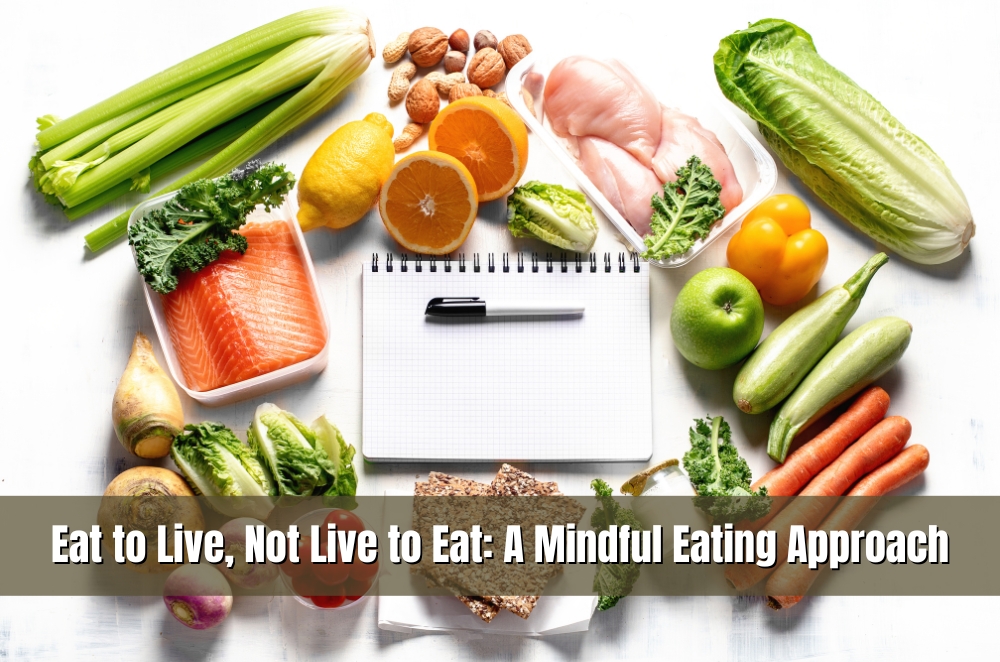Eat to Live, Not Live to Eat: A Mindful Eating Approach

Strong8k brings an ultra-HD IPTV experience to your living room and your pocket.
Ever feel like you're constantly battling food? One minute, you're craving something sweet; the next, you're beating yourself up for giving in. It's a daily battle, and it's most often rooted in a disconnection between our physical needs and our eating habits. The result can be overeating, poor food choices, and a general discomfort around food.
But what if it could be otherwise? What if there was another way that harnessed eating for nourishment and enjoyment without the accompanying guilt and stress? That is where mindful eating comes in. This article explores the principles of mindful eating and how it can change your relationship with food, especially the role of an accredited dietitian in guiding this process.
Understanding the essence of mindful eating
Mindful eating is more than what one eats; it is how one eats: present-focused, where the focus is placed on the signs that the body can provide, and self-acceptance concerning food. It’s not a diet; it is the mindset.
• Definition: Aware eating is employed while fully concentrating on the experience of eating. This encompasses the food's appearance, texture, and smell, while practitioners focus on the tactile and smell of hunger and satisfying signals.
• Distinguishing from dieting: Restrictive diets tell people what they cannot eat, whereas mindful eating shows people how to consume it. Mindful eating focuses on creating a proper attitude toward food besides fearing food, guilt, and shame.
• Benefits: Slow eating can do more than just help people control their weight. Other benefits include improved digestion, decreased stress, and enhanced food sustenance value.
Practical strategies for cultivating mindful eating habits
Being conscious of what one eats requires consistent effort; however, individuals should strive to make these improvements. Here are a few strategies to help you get started:
• Create a mindful environment: Exclude distractions such as phones or other screens during meals. Use nice plates, and if you’re comfortable with it, light a small candle. Make the environment as conducive as possible to a focused dining experience.
• Tune into your body's signals: Before taking a bite, ask yourself these questions: Are you truly hungry? Pay attention not only to the voice craving food but also to the sensations in your stomach.
• Savour each bite: Chew your food a little and thoroughly so that you actually perceive the assorted tastes that you are consuming. Leaving your fork on the plate between bites is also an effective way of purposefully slowing down.
• Be aware of your emotions: Do you engage in eateries because you are truly famished, or is cooking a way for you to deal with stress or break boredom? If you pay attention to your emotions, you can do things differently.
The impact of mindful eating on overall well-being
This is more than just a change in how one eats; it is a complete transformation of one's health and well-being. By actively participating in meals, your positivity can influence those around you, extending beyond mere weight control. This renewed focus on awareness can positively impact several critical areas, including the following:
• Improved digestion: It promotes effective digestion and nutrient absorption, as food is thoroughly chewed and given sufficient time to process.
• Sustainable weight management: Healthfully listening to the cues of hunger and fullness allows you to eat healthily and avoid gaining excess weight.
• Enhanced emotional well-being: Overcoming problem eating patterns can improve one’s emotional state and level of self-recognition. Additionally, integrating practices like physical activity to strengthen mood can further support a positive emotional balance, creating a holistic approach to well-being.
• Connection to physical health: Gentle eating helps you recognise your body's signals, enabling you to make healthier food choices.
The role of professional guidance in mindful eating practices
Starting a journey of self-reflection is a profound journey, but having professional help from an accredited dietitian will enhance it. This is especially so given the rootedness of eating habits and the possibility of dietary or health complications.
• Tailored advice: A professional dietitian should be sufficiently experienced to provide individualised guidance for each person according to their needs, preferences, and lifestyles so that the person can change to a more conscious selection of foods.
• Addressing underlying concerns: They are capable of identifying any hidden nutritional deficiencies, food sensitivities, or health issues that influence eating patterns.
• Navigating challenges: Replacing long-conditioned habits doesn't come quickly. An accredited practising dietitian gives support and a guiding hand while overcoming setbacks that might slow a person down.
Integrating mindful eating into daily life
It does take some time to adjust to mindful eating. It involves making several minor, enduring changes and much patience.
• Start small: Use one or two mindful eating techniques to begin with. For example, you may start by clearing distractions like your phone away while eating or by taking a few deep breaths before you start eating to centre yourself.
• Be consistent. The key to establishing any new habit is regular practice. Consistently practising short mindful eating sessions is more effective than infrequent attempts at longer sessions.
• Practice self-compassion: Be kind to yourself in this process. If your mind wanders back to old habits, do not judge yourself. Recognise it, gently bring your awareness back to the present moment, and move forward with your practice.
Mindful eating and specific dietary needs
Another necessary strength of mindful eating is that it's adaptable. It's not about a strict regime but about creating a framework adaptable to different nutritional needs and restrictions. This would imply that the main principles of mindfulness could also apply to someone following a vegetarian, vegan, or gluten-free diet or because they have some particular diseases to be taken care of, like diabetes or gastrointestinal disorders.
• Adaptability: Awareness, non-judgment, and attention to inner signals can be applied to any eating pattern.
• Complementary approach: In chronic conditions, mindful eating may be a functional complementary approach to specific dietary advice from health professionals, such as accredited dietitians. Additionally, better foods for digestive health help manage digestive health more effectively.
• Holistic management: Mindful eating, together with specific dietary guidance, can be applied to the effective management of various diseases and improvement of life quality by considering not only the physiological but also behavioural dimensions of eating.
Conclusion
Mindful eating can offer a path to a healthier balance with food. It’s about shifting from a reactive, often stressful approach to eating to a more intentional and nourishing experience. Remember, integrating these practices is a journey, not a race. Start small, remain consistent in your efforts, and approach the process with patience and kindness toward yourself.
Experienced practitioners can provide tailored strategies for those requiring personalised navigation and guidance. Dietitian-based methods of exploring nutrition can support individuals in achieving their personal health-related goals, especially when dietary intake presents specific challenges. By embracing mindful eating practices, you can foster positive changes in your relationship with food and overall well-being.
Note: IndiBlogHub features both user-submitted and editorial content. We do not verify third-party contributions. Read our Disclaimer and Privacy Policyfor details.




